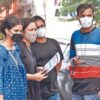How universities can help students ease out of pandemic-induced mental fatigue
Govind Narayan Singh, Secretary, Gopal Narayan Singh University
College and university managements have witnessed firsthand the impact of Covid-19 on students’ mental health over the last year. A significant rise in mental and emotional fatigue has been reported by 53 percent of first-year undergraduate students. Nearly 70 percent had “high expectations of academic difficulties,” compared to 42 percent of peers who did not report mental fatigue.
According to TimelyMD’s recent survey results, 60 percent of college students are more stressed and anxious than they were a year ago. Unsurprisingly, students are becoming increasingly anxious as the delta variant threatens to dash dream for a “regular” school year.
60 percent of college students reported that they are more stressed and anxious than they were a year ago. 64 percent of respondents are particularly concerned about the impact of COVID-19 social distancing standards on their social life. In 2020, there were limited options for building important relationships and identities through remote learning. The time is ripe for educators to focus on helping kids cope with mental health issues, academic pressure and emotional fatigue.
Throughout the epidemic, students have had to adapt to the new normal including online learning, travelling amid the pandemic to write exams and a continual battle with room occupancy in hostels.
The manifold challenges confronting students
A Delhi University student expressed that the new education system in India is taking a big leap from offline to the online mode but not many families have the financial acumen to buy laptops and other digital devices required for online classes. She further added that her rural peers don’t even have Wifi or stable internet connection to access online classes. Yet, those who manage to pursue online learning get glued to their device screens for long hours and are battling with stress-related disorders.
Another student spoke about how stressful his experience of travelling from Delhi to Chandigarh to write the Delhi University entrance test was. Innumerable fears grappled him while staying in a hotel, eating food outside, and travelling at the risk of contracting the virus.
Post-Covid is still a fantasy since no one knows when the pandemic will be over and students will return to the campus. However, a large majority of students and teachers, many of whom complained about going to campus on a daily basis, are now emotionally exhausted and eager to return.
Prioritising mental health and ensuring adherence to Covid-19 safety guidelines
Some college students are neglecting safety precautions. Transmission is taking place in campus settings when people are not using masks. Some institutions are attempting to find a balance between incentives for adopting preventive practices and penalties for disobedience.
Despite the availability of a vaccine, the pandemic is far from over. Therefore, the onus is on institution leaders to create an atmosphere in which students can thrive. Some ways in which the managements of institutions can ensure physical and mental well-being of students on campus are outlined below.
Campuses should have a sterilising tunnel to walk through, and students should be required to maintain a distance of at least four feet from their peers.
Lunch can be staggered to avoid crowding at restaurants, and session times can be adjusted to reduce disturbance in the hallways.
Mobile phones are no longer just a waste of time; they are the forerunner of time management in the modern world. All students will be required to have a digital persona which includes networked cellphones, wifi-driven high-speed digital access at home, and cameras, etc.
While a single student may only need to travel to school for two to three days per week, most staff and faculty members may need to be on campus for five to six days.
Also Read:Impact of online classes on children’s mental health

















Add comment